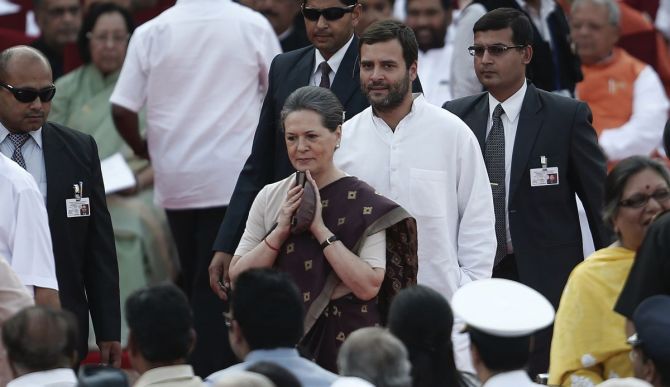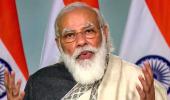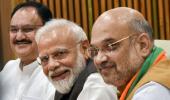'Painting opponents as the enemy of the State, using fake news, making wild allegations about rival parties, curtailing civil liberties and challenging the Constitution itself are worrying developments.'

Sanjay Jha is making more news for his political views now than when he was a Congress party spokesperson.
After being ousted from the party's spokesperson list, Jha is seen everywhere.
Be it social media, the television news channels or newspaper articles, he is hitting the headlines for his bold comments.
Jha has now published a book, The Great Unravelling: India After 2014.
It gives you important insights into how India has changed since the Narendra Damodardas Modi-led BJP came to power; it also reveals the inside workings of the Congress party.
If you are interested in Indian politics, this book is a must read.
In a two-part interview, Sanjay Jha speaks to Rediff.com's Syed Firdaus Ashraf about the insights he has shared in The Great Unravelling: India After 2014.
The Great Unravelling: India After 2014 reveals your agony as you witness how India has turned into an illiberal democracy post 2014.
Is all hope lost for India? Or, as an eternal optimist, do you feel we can regain our liberal democracy by defeating the politics of hate?
I am convinced that, at the core, you cannot suppress and oppress a vast country of 138 crore people, possessing such incredible diversity, through political intimidation or institutionalised asphyxiation.
The Congress was decimated post the Emergency in 1977 and Mrs Gandhi lost her seat from Rae Bareli.
At our core, we remain a liberal nation going through a phase of State-sponsored fear.
The fact that dissenters are being branded as 'anti-national' is a travesty.
Painting opponents as the enemy of the State, using fake news, making wild allegations about rival parties, curtailing civil liberties and challenging the Constitution itself are worrying developments.
In their seminal work, How Democracies Die by Daniel Ziblatt and Steven Levitsky, they point out the above as dangerous signs of an imminent collapse.
But I think it is an aberration in India. It is also transient.
The protesting farmers are a manifestation of the fact that civil society will fight back.
Illiberal democracies lead to autocracy and therefore India needs a vigilant Opposition.
But I am very sanguine about India.
In your book, you mention meeting a stockbroker in Mumbai who was not concerned about the lynching of Muslims.
How has such insensitivity crept into the land of Mahatma Gandhi?
Do you think this is a post-2014 phenomenon or has it always been part of our nation's psyche?
I am sure everything is not a sudden occurrence post-May 2014. The symptoms were perhaps always there; now, those bottled up emotions are finding expression.
But it is worrying nevertheless.
After the BJP's humongous victory twice in the Lok Sabha, the rabid hatemongers among the right wing have got an adrenaline boost.
A society that lacks emotional empathy for its minorities is still developing, embryonic.
We have a long way to go.
Frankly I was horrified at the cold, detached and callous indifference to lynching murders in urban India.
It soon became a new normal.
During your visit to the XLRI campus, you were asked which living or dead person would be your ideal dinner guest. Your answer was Mahatma Gandhi.
In today's India, wouldn't Veer Savarkar would be a better answer?
Hasn't Gandhi's inclusive India lost to Savarkar's India?
Mahatma Gandhi inspired Martin Luther King Jr and Nelson Mandela.
The current crop of Nathuram Godse fans has a distorted understanding of Indian history.
Perpetrators of a violent ideology cater to a small minority who are extremely vocal.
Gandhi is the personification of non-violence in a world that lives with hate, divisiveness, racism and terrorism.
He is a beacon to modern civilisation. He is irreplaceable. He is incomparable.
Does Modi get more last mile delivery votes or Hindu votes?
Many commentators ignore his extraordinary efforts in bringing government subsidies to the homes of the poor.
Both, I would say. But the last-mile delivery does appear to be largely true.
There are large sections of India's secular-liberals who have distrusted Prime Minister Modi since the Gujarat genocide of 2002.
And that position has only hardened since; India is an established polarised country right now.
Both the Right and Left abhor each other passionately.
We are all blindsided.
But the fact is that Modi did manage to successfully reach out to the poorer sections of rural India with free gas cylinders, PM-Kisan, low-cost housing, health insurance, toilets, rural infrastructure (water and electricity), bank accounts, etc.
Even the UPA's MNREGA was given an aggressive push.
More critically, he communicated that effectively.
The Congress, of course, neglected to celebrate its own accomplishments.
It has also abandoned its unique centrism which is what India needs.

The Congress is losing election after election. And Congressmen are finding solace by telling themselves that this is okay because they are fighting on the right side.
Have Congressmen lost the fire in their belly when it comes to winning elections?
I think Congressmen have become indolent, lazy over the last couple of years.
Everyone seems to be in the trance of Ram bharose and awaiting anti-incumbency against the Modi government.
Heavenly blessings have dried up.
We are not a zealous, pro-active, 'hungry' party.
As a party, I am stunned as to how, when we lose states (West Bengal, Tamil Nadu, Odisha, Uttar Pradesh, Bihar, Gujarat), we disappear for decades.
The recent debacles in Bihar, Delhi and Hyderabad have proved that we have not yet learnt our lessons.
The BJP is getting a walkover and we are providing them with a red carpet.
Why did the Congress go with the slogan 'Chowkidar chor hai' in the election when they knew it was not grabbing the voters' imagination?
Did no one in the Congress tell Rahul Gandhi to stop because Indians didn't believe Modi was personally corrupt?
Initially, Rafale created a huge hullabaloo so Rahul Gandhi was justified in repeatedly attacking the prime minister.
But his casual assertion that the Supreme Court had also agreed with the 'Chowkidar chor hai' slogan completely backfired.
It was a terrible faux pas that enabled Meenakshi Lekhi to take up the matter legally.
Rahul was forced to apologise to the Supreme Court and, with that, public perception changed dramatically.

In your book, it was interesting to read that the Congress expected to win more than 125 seats in 2019.
What made the Congress think-tank believe this was possible?
Back-of-the-envelope calculations made 115 seats seem highly probable.
And remember, the Congress was experiencing tailwinds electorally in the last few elections compared to the BJP; Gujarat and Karnataka and then, of course, the triple triumphs in Rajasthan, Madhya Pradesh and Chhatisgarh.
So the optimism was not entirely misplaced.
But it is also a fact that there were some people who were suffering from the Alice in Wonderland syndrome and were telling the high command that the Congress would get 160-175 seats easily.
That think-tank was not thinking; it was hallucinating.
If Balakot had not happened, would Modi have had such a big electoral victory?
One gets the feeling that the 2019 election was the victory of muscular nationalism.
There can be no doubt that the BJP found political windfall in the Pulwama terror attack fallout that led to the Balakot airstrikes.
It was in sync with their hyper-nationalism narrative.
Remember, in times of war, people usually stand with the government, irrespective of their general misgivings.
But the Opposition, particularly the Congress, failed to change the narrative and appeared clueless when it came to combating the BJP.
It was appalling that the Congress was called 'anti-national' and 'pro-Pakistan' by the BJP and Modi and we barely counterattacked.
It was a shockingly inept, impotent fightback.
We paid the price.
The Congress fought for India's freedom struggle, for heaven's sake.
Feature Presentation: Aslam Hunani/Rediff.com











